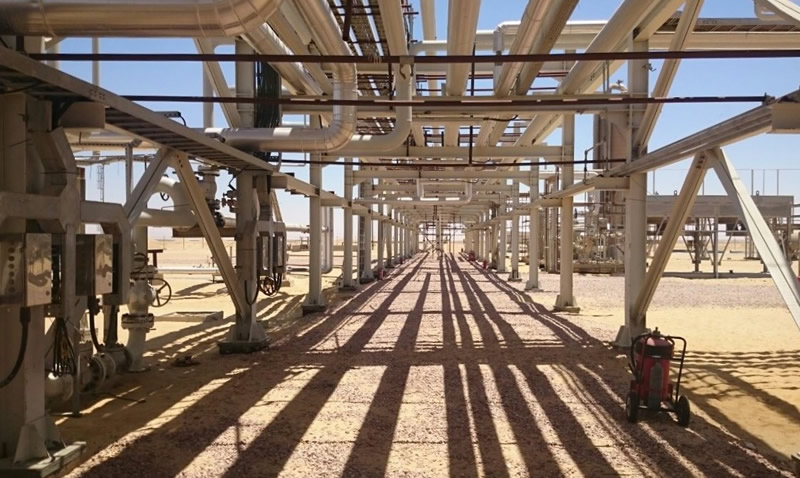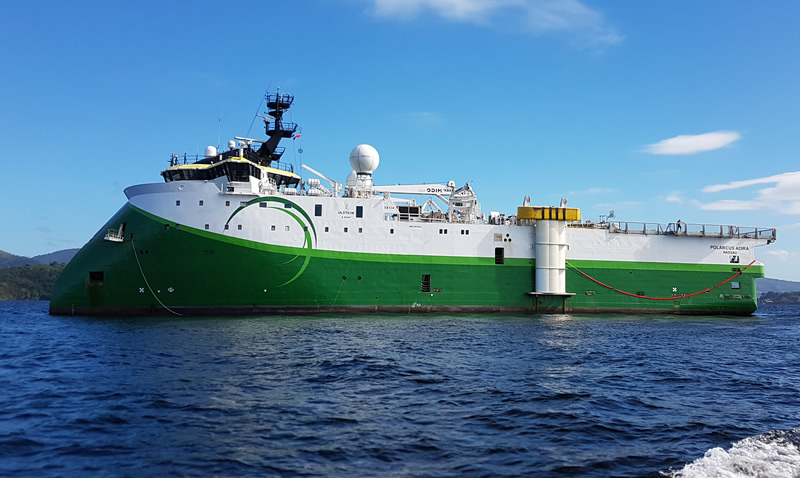United Oil & Gas has returned to trading on London’s Alternative Investment Market (AIM) and is nearing completion of its acquisition of a stake in Egypt’s Abu Sennan licence.
It is the “perfect asset” for United, the company’s CEO Brian Larkin told Energy Voice. “We looked at a number of opportunities but Egypt was the best. There’s an attractive risk profile, with 17 wells across seven fields, so we’re not too reliant on any one well. The operating cost was the lowest we’ve seen, at $6.5 per barrel, it’s a really good fit for us.”
The deal was struck in July, with United agreeing to pay $16mn to Rockhopper Exploration for the Abu Sennan stake. It paid a deposit of $300,000 on signing with the remaining amount to come in a combination of cash and shares. The shares issued to Rockhopper will account for around 18.5% of United’s shares, with $11.5 million in cash. The seller will focus instead on work on the $1.8 billion Sea Lion project, in the North Falklands Basin.
United will seek confirmation from its shareholders for the purchase at a meeting in London on December 23. Given this, the completion of the deal is now expected to occur in January.
Challenges
Larkin was unconcerned by some of the historic issues around operating in Egypt. Following the 2011 revolution, the economic strain on the government became clear with debts piling up to foreign companies for production. “That’s all been rectified,” Larkin said. “International oil and gas companies receive payment in around 30 days. It’s a great place to do business, it has a stable credit rating, it’s committed to working with the International Monetary Fund (IMF) on reforms and a lot of majors have gone back to the country.”
One of the majors that is increasingly active in Egypt is BP, which has major gas production in the offshore. The super-major has signed a prepaid swap deal with United, underpinned by a hedge, Larkin continued. “It’s a real validation to have BP at the table and that they’re supportive of United,” he said.
The BP pre-payment offers up to $8mn, with the AIM-listed company expecting to draw the full amount to help fund the Rockhopper deal. United said the financing structure included a hedge of some of its production. Under the agreement, United will make repayments over 30 months based on dated Brent prices for an agreed volume.
While the asset is appealing and BP’s support welcome, taking the United pitch to market has been “very tough”, Larkin continued, noting there had been disappointing results across the sector and there was some uncertainty around the impact that Brexit may have.
That United has managed to line up a cash raise of $6.25mn, through the issue of around 159mn shares, is a “validation of the company and the deal”, the CEO continued.
Despite this challenge, United is “always looking to grow our business. In the first half of 2020, the focus will be on bedding down this acquisition and bringing it into the United group. There’ll be no M&A in the first half, I’d have thought,” Larkin said, although allowing that this might change if an unmissable opportunity presents itself.
Operations
The acquisition will involve United taking a 22% stake in the Abu Sennan concession, through the purchase of Rockhopper Egypt. This will provide around 1,100 barrels of oil equivalent per day to United, with 2.66mn boe net of 2P reserves, as of mid-2019. Production is rising on the licence, from 4,000 boepd at the beginning of 2019 to around 5,000 boepd.
Kuwait Energy is the operator of the Abu Sennan asset and it plans to drill four wells in 2020, one per quarter. The operator is “very receptive to our ideas and we are looking to work with them to find the most efficient work programme”. Keeping a non-operated presence suits United for now, he said, as it keeps overheads low but that may change as the company grows.
Kuwait Energy has a 25% stake as does Global Connect, while Dover Investments has 28%. Kuwait Energy carries Dover’s costs and receives Dover’s share of cost oil plus 7.5% of the company’s profit oil.
In the near term, the plan is to increase production on the fields but there is some exploration upside on the licence and it makes sense to pursue these. Well costs are cheap, Larkin noted, at a gross cost of $3 million per well. Drilling was successful in three of four wells in 2017, with further successes seen this year at the Al Jahraa-11 well, which was producing just under 800 bpd of oil in June.
United also expects to bring an Italian well into production in the third quarter of next year, in addition to farming down its asset in Jamaica and potentially drilling a well onshore in the Wessex Basin. Furthermore, it expects to complete its sale of its Crown asset, in the North Sea, by the end of the year.
It is the “perfect asset” for United, the company’s CEO Brian Larkin told Energy Voice. “We looked at a number of opportunities but Egypt was the best. There’s an attractive risk profile, with 17 wells across seven fields, so we’re not too reliant on any one well. The operating cost was the lowest we’ve seen, at $6.5 per barrel, it’s a really good fit for us.”
The deal was struck in July, with United agreeing to pay $16mn to Rockhopper Exploration for the Abu Sennan stake. It paid a deposit of $300,000 on signing with the remaining amount to come in a combination of cash and shares. The shares issued to Rockhopper will account for around 18.5% of United’s shares, with $11.5 million in cash. The seller will focus instead on work on the $1.8 billion Sea Lion project, in the North Falklands Basin.
United will seek confirmation from its shareholders for the purchase at a meeting in London on December 23. Given this, the completion of the deal is now expected to occur in January.
Challenges
Larkin was unconcerned by some of the historic issues around operating in Egypt. Following the 2011 revolution, the economic strain on the government became clear with debts piling up to foreign companies for production. “That’s all been rectified,” Larkin said. “International oil and gas companies receive payment in around 30 days. It’s a great place to do business, it has a stable credit rating, it’s committed to working with the International Monetary Fund (IMF) on reforms and a lot of majors have gone back to the country.”
One of the majors that is increasingly active in Egypt is BP, which has major gas production in the offshore. The super-major has signed a prepaid swap deal with United, underpinned by a hedge, Larkin continued. “It’s a real validation to have BP at the table and that they’re supportive of United,” he said.
The BP pre-payment offers up to $8mn, with the AIM-listed company expecting to draw the full amount to help fund the Rockhopper deal. United said the financing structure included a hedge of some of its production. Under the agreement, United will make repayments over 30 months based on dated Brent prices for an agreed volume.
While the asset is appealing and BP’s support welcome, taking the United pitch to market has been “very tough”, Larkin continued, noting there had been disappointing results across the sector and there was some uncertainty around the impact that Brexit may have.
That United has managed to line up a cash raise of $6.25mn, through the issue of around 159mn shares, is a “validation of the company and the deal”, the CEO continued.
Despite this challenge, United is “always looking to grow our business. In the first half of 2020, the focus will be on bedding down this acquisition and bringing it into the United group. There’ll be no M&A in the first half, I’d have thought,” Larkin said, although allowing that this might change if an unmissable opportunity presents itself.
Operations
The acquisition will involve United taking a 22% stake in the Abu Sennan concession, through the purchase of Rockhopper Egypt. This will provide around 1,100 barrels of oil equivalent per day to United, with 2.66mn boe net of 2P reserves, as of mid-2019. Production is rising on the licence, from 4,000 boepd at the beginning of 2019 to around 5,000 boepd.
Kuwait Energy is the operator of the Abu Sennan asset and it plans to drill four wells in 2020, one per quarter. The operator is “very receptive to our ideas and we are looking to work with them to find the most efficient work programme”. Keeping a non-operated presence suits United for now, he said, as it keeps overheads low but that may change as the company grows.
Kuwait Energy has a 25% stake as does Global Connect, while Dover Investments has 28%. Kuwait Energy carries Dover’s costs and receives Dover’s share of cost oil plus 7.5% of the company’s profit oil.
In the near term, the plan is to increase production on the fields but there is some exploration upside on the licence and it makes sense to pursue these. Well costs are cheap, Larkin noted, at a gross cost of $3 million per well. Drilling was successful in three of four wells in 2017, with further successes seen this year at the Al Jahraa-11 well, which was producing just under 800 bpd of oil in June.
United also expects to bring an Italian well into production in the third quarter of next year, in addition to farming down its asset in Jamaica and potentially drilling a well onshore in the Wessex Basin. Furthermore, it expects to complete its sale of its Crown asset, in the North Sea, by the end of the year.



